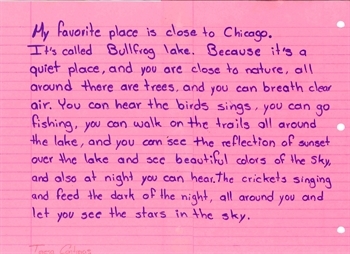
Gabriel Fernandez, Level 1 student at Poder Learning Center
This past summer was one of rediscovery for Chicagoland's great places and spaces. The allure of "stay-cations" led many people to share their favorite of the region's many parks, gardens and plazas with their friends and families. The "What Makes Your Place Great?" photo and video contest generated substantial public and media interest. People from throughout the region reminded us all of the hidden and not-so-hidden places that have affected them in some poignant, personal way – often over the course of years, lifetimes and generations. Likewise, the Olympics bid, the Burnham Centennial, and the GO TO 2040 regional planning process prompted thousands to consider what they love about the region, how it came to be, and how to ensure their values are reflected in future growth and development. Hopefully this rush of regional rediscovery was just the beginning.
At the same time as many of us were rediscovering the region, others were discovering it for the first time. The immigrant experience with place is telling. For many non-native English speakers, exploration is a tentative experience. If you feel alone (regardless of whether you in fact are), you are alone. Stores, post offices and schools can be daunting – as social institutions they possess particular language and customs that are alien to the uninitiated. It can be difficult, if not impossible, to make those places your own.
Public spaces, in contrast, can often provide a less rigid and more familiar opportunity to experience one's new home. Inspired in part by the "What Makes Your Place Great?" contest, students of English as a Second Language at Poder Learning Center in Pilsen wrote about their favorite public spaces in the region. Here’s a sampling of the essays, in their own words, colors and photos. The vast majority of Poder's students hail from Mexico, and live primarily in the Pilsen and Little Village neighborhoods of Chicago. The essays, written by adult students with a range of English ability (and one who is building Spanish literacy as a precursor to English), offer a glimpse into the processes of discovery, experience, and, ultimately, embracing particular places as an integral part of one's life.

Not all of the essays are actually about public places – one student wrote about their home, another about their job – and we decided the one about the Festival of Leon was cool, so we included that too.
So take a look and see the region anew through someone else's eyes. You may find you discover something, or somewhere, new. I, for one, am eagerly awaiting an Ecuadorian fritada at Montrose Beach come spring.